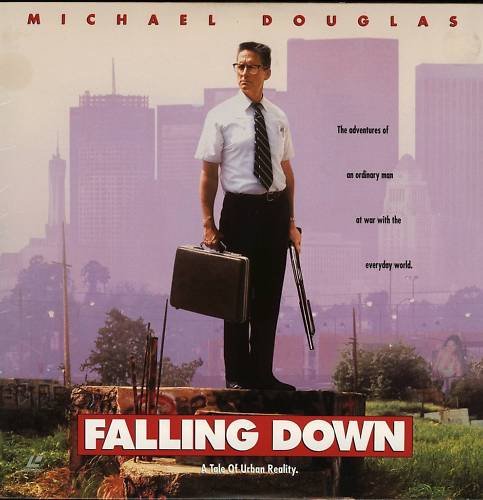
Falling Down (1993) provides a snapshot of the dysfunction in society during the race wars that were at the forefront during the 1992 riots in Los Angeles. As the film begins we see that William Foster (Michael Douglas) is stuck in traffic and is experiencing some sort of mental break. His palms are sweaty and every sound and sensation is magnified. It is then that he decides that he is going to walk “home” to his little girl’s birthday party. He grabs his briefcase, ditches his car in traffic and starts walking. As the movie progresses we find out that he no longer lives at “home” with his family. His wife is now his ex-wife and that he has been fired from his job as a defense engineer which has rendered him unable to make his child support payments. On top of that he is now forced to live with his mom who is mentally unstable and loves to collect miniature glass animals.
Along the way William encounters several people with whom confrontations ensue easily. He wants to call and talk to his “wife” and daughter so he stops at a liquor store where he asks the store owner to make change for a dollar so he can use the payphone outside. He picks out a Coke but the store owner says that it’s 85 cents which won’t give William the 2 quarters he needs for the phone call. William, who is now thoroughly aggravated, asks the Korean store owner why he has mispronounced the word “five” like “fi”. he wonders out loud, “What, they don’t have v’s in China?” The store owner is nonetheless appalled and responds that he is from Korea. William retorts with “Eh, whatever! You come to my country take my money and then don’t even have the grace to learn how to speak my language?” then goes on a tirade asking him if he knows how much money his country (The U.S.) has given his country. When the owner tries to kick him out he responds by stealing his bat from behind the counter that the store owner was about to use on him.
In a following scene he encounters an army surplus store owner who knows the cops are looking for D-Fens as William has decided to call himself. The surplus owner takes advantage of this knowledge and lures him down to his basement to show him his Nazi and war memorabilia. At this point the store owner is somewhat infatuated with D-Fens and admires him as a vigilante. Unfortunately, D-Fens disagrees with the store owner and tells him he is not a vigilante and he’s just trying to get home to see his little girl. The store owner gets violently angry and D-Fens tells him that there are very distinct differences between them. D-Fens considers himself “an American” and he calls the store owner a “sick fuck”. When the store owner tries to steal his guns and breaks the snow globe, a gift for his daughter, D-Fens is forced to defend himself and proceeds to stab him and shoot him until he is dead. Throughout his walk through urban Los Angeles D-Fens experiences racial discrimination, disrespect and violence. But the question in this case remains why.
Why has D-Fens fallen down the rabbit hole of societal dysfunction? How big of a role does it play that he has lost his job and is no longer economically viable? D-Fens is a broken man, his job has been taken away and therefore he has also lost his family including his beloved wife and his beautiful little daughter. D-Fens has lost his place in society and has taken it upon himself to take his anger out on those he thinks are responsible for his downfall. The Korean store owner represents the foreigners invading his country and taking jobs away from the “real” American people. The Nazi Surplus store owner exemplifies the people in society that D-Fens considers un-American, those who preach about American culture and values but truly don’t know anything about their own country. In his mental break he is going to right every “wrong” that society has done to him. In trying to escape his own bleak outlook for the future, he becomes hypersensitive to the injustice all around him. Maybe, as Michael Omi suggests in his article entitled In Living Color:Race and the American Culture, “dramatic instances of racial tension and violence merely constitute the surface manifestations of a deeper racial organization of American society- a system of inequality which has shaped, and in turn been shaped by, our popular culture” (549).
Who do you identify with the most? The Korean store owner who is harassed by some crazed white man on the verge of a nervous breakdown? The white man who has lost his job/family? The racist surplus store owner that believes that we should support vigilantism?
On Twitter @jess_miller_310


